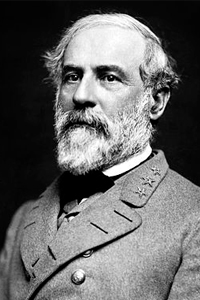Robert E. Lee
Robert E. Lee revealed his military promise in 1829, finishing second in his class at West Point without a single demerit. After duty as an engineering officer at remote outposts, he served in the Mexican War and was commended repeatedly for his actions. His engineering feats solidified his position as perhaps the foremost officer in the Army. Following service as superintendent of West Point, he was deployed with the U.S. Cavalry to the western plains.
During the Civil War, Lee organized his Army of Northern Virginia from a mixed tapestry of troops into one of the most formidable and effective fighting forces ever known. He did this despite a severe disparity of numbers and chronic shortages of basic supplies, such as food, clothing and medical supplies. Always considerate of his men, he surrendered at Appomattox rather than expose them to more bloodshed when he faced the inevitable.
Early in his adult life, Lee became the consummate Christian soldier. He thanked the Almighty for his numerous victories and often took defeat as a rebuke from above. Throughout his military career, his family – especially his invalided wife – remained his foremost concern.
Lee considered that his most important work was done during reconstruction as he sought to instill among Southerners a lack of bitterness and a sense of union with the reunited country. He worked diligently as president of Washington College to prepare young men of the South for a productive future while instilling in each one of them his own gentlemanly and Christian attributes.
It is quite easy for veterans to admire him and try to emulate such a soldier and citizen.
– Donald Hopkins, Mississippi surgeon, Vietnam War veteran, and author of “Robert E. Lee in War and Peace: The Photographic History of a Confederate and American Icon”

